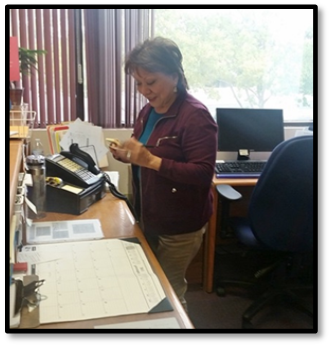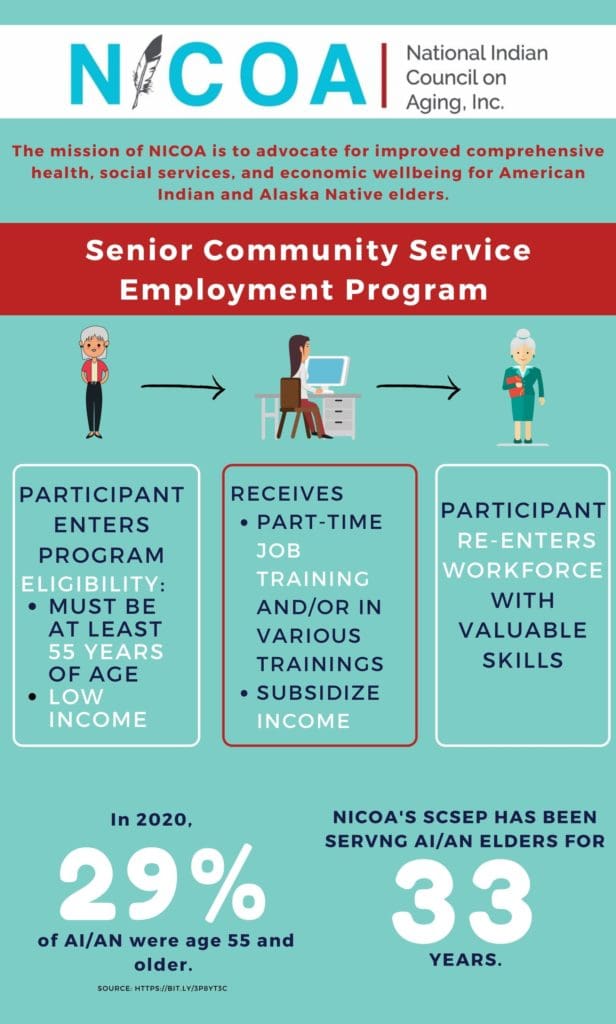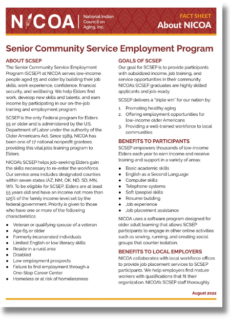Senior Community Service Employment Program (SCSEP): Job Training for Elders
At the National Indian Council on Aging (NICOA), we help elders find work, develop new skills and talents, and build their financial security by taking advantage of the Senior Community Service Employment Program (SCSEP). SCSEP is an on-the-job training and employment program designed to help those age 55 and older update their jobs skills, build work experience and confidence, and continue to have economic security and well-being.
SCSEP is administered by the U.S. Department of Labor under the authority of the Older Americans Act of 1965, Title V. SCSEP is the only federally funded community service and job training program focused exclusively on serving low-income elders 55 and older, in nearly all 3,000 U.S. counties and territories through state and national grantees. SCSEP helps job-seeking elders gain skills necessary to re-enter the workforce. The program provides grant sponsored (subsidized) income and training to participants while they serve their communities, which improves their well-being and prepares them for regular (unsubsidized) employment.
 NICOA’s SCSEP
NICOA’s SCSEP
In 1989, NICOA was awarded reserved funding specifically to provide Older Americans Act, Title V, services to American Indian and Alaska Native elders. NICOA’s SCSEP mission is to provide opportunity for low income elders through paid training, meaningful community service and skills development. Since that time, NICOA has continuously been awarded reserved funding to serve as a national SCSEP set-aside grantee, serving American Indian and Alaska Native elders across the country in areas most in need of support. SCSEP fits well within NICOA’s overall mission to advocate for improved comprehensive health, social services and economic well-being for American Indian and Alaska Native elders.
NICOA’s SCSEP provides services to anyone in our service areas eligible for the program. Today, NICOA administers SCSEP in seven states: Arizona, Minnesota, New Mexico, North Dakota, Oklahoma, South Dakota and Wisconsin. NICOA is one of 17 national grantees providing these services, and one of two providing services to American Indian elders in the U.S.
Who is eligible to participate in SCSEP?
Anyone is eligible that is at least 55 years old (there is no upper age limit), unemployed and who is a member of a family with an income that is not more than 125 percent of the family income levels established by the federal government (Health & Human Services poverty levels). Although NICOA has a special purpose in working with American Indian elders, it is not required that applicants be an American Indian or Alaska Native to participate in SCSEP.
Priority is given to those who have one or more of the following characteristics:
- Veteran, or qualifying spouse of a veteran
- Age 65 or older
- Limited English or low literacy skills
- Reside in a rural area
- Disabled
- Low employment prospects
- Failed to find employment through the employment One-Stop System
- Homeless or at risk of becoming homeless
Where does NICOA’s SCSEP operate?
- In seven states: Arizona, Minnesota, New Mexico, North Dakota, Oklahoma, South Dakota and Wisconsin.
- If you reside in a state NICOA does not serve, email us or call 505-292-2001 to be directed to a provider in your area.
- Headquartered in Albuquerque, New Mexico, with a regional office in Oklahoma City, Oklahoma.
Types of Community Service
Service types are quite varied, depending on the skill level of the individual and the needs of the local communities. Some examples are:
- Teachers aides
- Literacy aides
- Office clerical assistants
- Cook’s aides
- Library aides
- Day care assistants
- Maintenance assistants
This project has been 100 percent funded by a grant of $3,453,363 from the U.S. Department of Labor, Employment and Training Administration. The contents of this publication do not necessarily reflect the views or policies of the U.S. Department of Labor. If you are interested in this federally funded program and would like additional information, please contact us.

